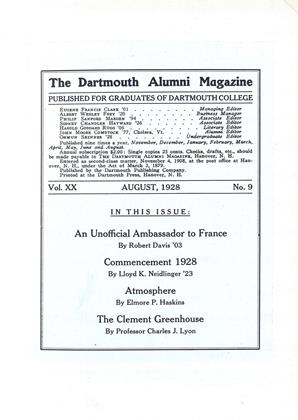The valedictory address to the graduating class was given by President Hopkins at the Baccalaureate exercises June 17:
"The great president of this College in my own undergraduate days used to say repeatedly, in addresses to the student body, that college men in particular had no right to expect to live in freedom and in safety upon the devotion and sacrifices of other men. This, it seems to me, ought to be the conclusion of the whole matter in attempting to define what a college course is all about.
"Dartmouth is not primarily a place or a
thing, an assembly of scholars or a student body. It is an influence, designed to make men realize their greater capacities and to be their better selves. The effect of this influence is acquired often unconsciously and always intangibly. It is the resultant of the great forces of courage and sacrifice and, most of all, solicitude for public welfare, which led to the foundation of the college and which have supported and maintained it in increasing strength for well toward two centuries.
"Where there is no vision, the people perish," said the prophet of old, and his words remain true today.
"The American people are in extraordinary degree dominated by a spirit of goodwill. In as great degree they are possessed of a common sense which leads them eventually to a solution of problems of a purely contemporary nature. It does not yet appear, however, that they are distinguished in as great degree either for their foresight or for their ability to safeguard against difficulties impending but remote.
"We attempt overmuch to simplify life; we seek for easy solutions; we look for short cuts; we assume too readily that good motives must inevitably lead to righteous action. As a matter of fact, life cannot be made simple; problems cannot be easily solved; there is no short cut to distinction; and unintelligent goodness may lead to unrighteousness.
"I would not attempt to make an all-inclusive statement as to the responsibilities of the college man but I would say that such are some of the fields of usefulness wherein the college man may make himself invaluable. Here are the points at which intelligent influence may be most advantageously applied.
"Not all of us can become great leaders and it is as well that we cannot. The progress of democracy is more dependent upon wise followers than it is upon supermen for leadership.
"If the college influence works effectively, men who go forth from the college should be possessed of those qualifies of intelligence and foresight which we call vision. Perhaps most of all they ought to be able to recognize leadership when it is offered and to be eager to support such leadership when it is found.
"There is a fable of Swift's which describes the complete powerlessness of the man of might who was bound down by the many threads tied by little men. Democracy requires that its men competent for leadership be protected from a like fate.
"So it comes about that those who love this College say of you today, as we who have held you in deep affection say, 'God grant that they be men of vision.' "
"The Lord bless thee, and keep thee; "The Lord make his face shine upon thee, and be gracious unto thee; "The Lord lift up his countenance upon thee, and give thee peace."
 View Full Issue
View Full Issue
More From This Issue
-
 Article
ArticleTHE UNOFFICIAL AMBASSADOR TO FRANCE
August 1928 By Robert Davis '03 -
 Article
ArticleEditorial Comment
August 1928 -
 Article
ArticleMEETING OF ALUMNI COUNCIL
August 1928 -
 Books
BooksGREEK THOUGHT IN THE NEW TESTAMENT.
August 1928 By Charles D. Adams -
 Sports
SportsSUMMARY OF ATHLETIC SCORES
August 1928 -
 Class Notes
Class NotesClass of 1918
August 1928
Article
-
 Article
ArticleIn Brief . . .
October 1959 -
 Article
ArticleTHE COLLEGE
November 1949 By C.E.W. -
 Article
ArticleTHE COLLEGE
October 1951 By C.E.W. -
 Article
ArticleHanover Browsing
November 1946 By HERBERT F. WEST '22 -
 Article
ArticleA GOOD WORD FROM HEADQUARTERS
MAY 1963 By ROBERT SARGENT SHRIVER JR. -
 Article
ArticleTwo Sides to Science
January 1952 By WILLIAM W. BALLARD '28


